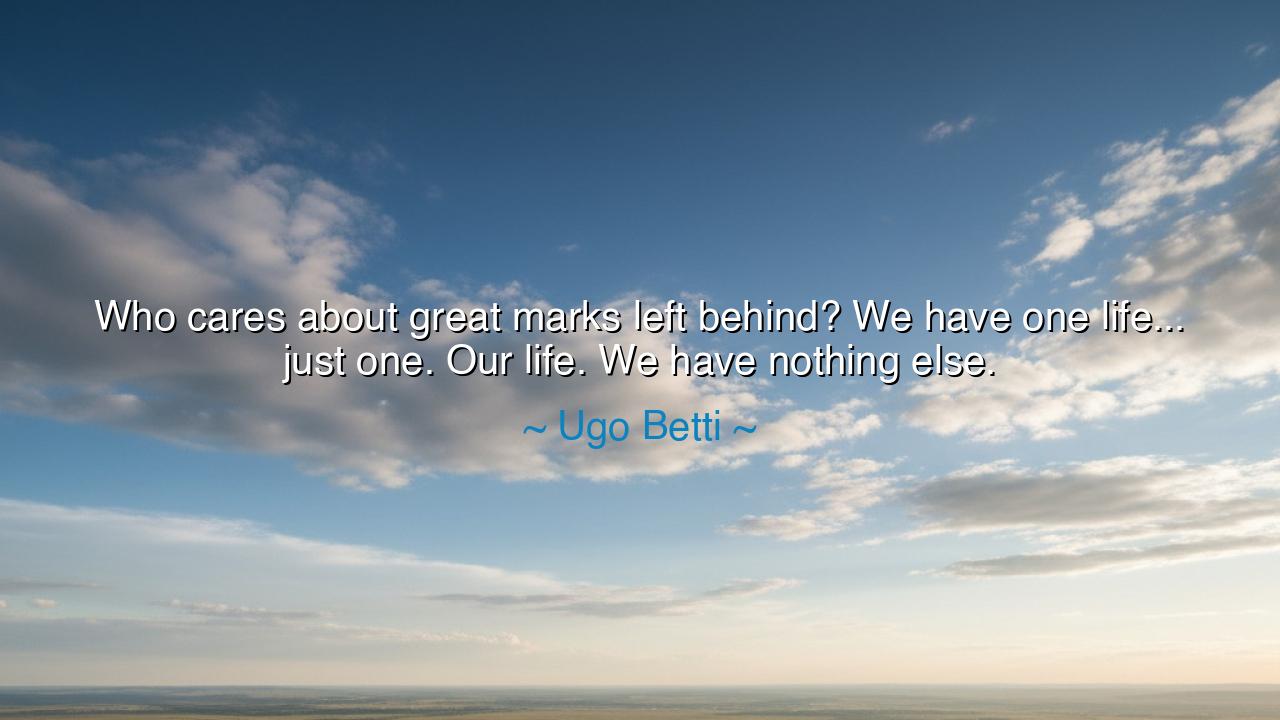
Who cares about great marks left behind? We have one life... just
Who cares about great marks left behind? We have one life... just one. Our life. We have nothing else.






When Ugo Betti, the Italian playwright and judge of the human soul, wrote: “Who cares about great marks left behind? We have one life… just one. Our life. We have nothing else,” he was not rejecting greatness, but revealing a deeper wisdom — that the true measure of existence lies not in what endures beyond us, but in the intensity and authenticity with which we live while we are here. His words burn like a quiet flame against the vanity of those who seek immortality through monuments and memory. He calls to us: live now, for the gift of life is not in legacy, but in presence.
Born in a time of war and uncertainty, Betti knew well the fragility of existence. He served as both a judge and a writer, standing between justice and art, between the world’s cruelty and its beauty. His experiences during Italy’s turbulent twentieth century taught him that fame and legacy are fragile illusions — swept away by the tides of time, like footprints on a shore. To him, it was folly to live for remembrance when the moment itself, fleeting and luminous, held all the truth we could ever need. In this, he echoed the wisdom of the ancients who knew that to chase eternity is to miss the miracle of the present breath.
In every age, there are those who strive not to live, but to be remembered. Kings carve their names in stone; conquerors raise cities upon the bones of the fallen. Yet when centuries pass, the names fade, and even the monuments crumble. Consider Alexander the Great, who dreamed of empire that would outlast the ages. He conquered worlds before his thirtieth year, yet died young, and his kingdom dissolved in chaos. His “great marks” remained, yes — but he did not live to see them, nor could they console him in death. Betti’s words pierce this illusion: the world may remember your deeds, but it cannot give you back the life you failed to live fully.
To live truly, Betti teaches, is not to chase after echoes, but to dwell in the fullness of being — to feel deeply, to act justly, to love without restraint. The meaning of life is not found in the applause of others, but in the intensity of one’s own experience. The sunrise seen alone, the kindness given without witness, the joy that blooms from simple existence — these are the treasures no history can record, but which make the soul rich beyond measure. To live for remembrance is to live in shadow; to live for life itself is to stand in the sun.
There is an ancient resonance in his thought, for even the philosophers of old warned against the seduction of legacy. Marcus Aurelius, emperor and stoic, wrote in his meditations: “Soon you will have forgotten all, and soon all will have forgotten you.” Yet he did not say this in despair, but in liberation. For when one ceases to live for what remains, one begins to live for what is — the simple, sacred act of being alive. So too, Betti calls us to awaken from our obsession with greatness and to taste instead the sweetness of the hour.
The lesson is simple, but profound: our life is our only true possession. It is not the monuments we build, nor the praises we earn, that define our worth — it is the quality of our living, the courage to inhabit our brief time with wonder and sincerity. To waste life in pursuit of remembrance is to trade gold for dust. To live for joy, for love, for truth, is to fulfill our highest calling. For what greater mark can one leave upon the world than the light of a soul that lived honestly and fully?
So, remember this, you who walk the earth for a fleeting moment: do not live for your name to be carved in stone. Live for the breath you take, for the laughter you share, for the hands you hold. The world may forget your deeds, but you will have lived — and that is enough. For, as Ugo Betti reminds us, “We have one life… just one.” Let that truth burn within you like a sacred fire. Guard it, cherish it, and let your days be filled not with the fear of being forgotten, but with the grace of having truly been alive.






AAdministratorAdministrator
Welcome, honored guests. Please leave a comment, we will respond soon